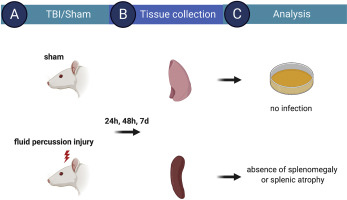当前位置:
X-MOL 学术
›
J. Neuroimmunol.
›
论文详情
Our official English website, www.x-mol.net, welcomes your
feedback! (Note: you will need to create a separate account there.)
Experimental traumatic brain injury does not lead to lung infection
Journal of Neuroimmunology ( IF 2.9 ) Pub Date : 2020-06-01 , DOI: 10.1016/j.jneuroim.2020.577239 Mujun Sun 1 , Rhys D Brady 2 , Brooke Wanrooy 3 , Richelle Mychasiuk 1 , Glenn R Yamakawa 1 , Pablo M Casillas-Espinosa 2 , Connie H Y Wong 3 , Sandy R Shultz 2 , Stuart J McDonald 4
Journal of Neuroimmunology ( IF 2.9 ) Pub Date : 2020-06-01 , DOI: 10.1016/j.jneuroim.2020.577239 Mujun Sun 1 , Rhys D Brady 2 , Brooke Wanrooy 3 , Richelle Mychasiuk 1 , Glenn R Yamakawa 1 , Pablo M Casillas-Espinosa 2 , Connie H Y Wong 3 , Sandy R Shultz 2 , Stuart J McDonald 4
Affiliation

|
Traumatic brain injury (TBI) patients often experience post-traumatic infections, especially in the lung. Pulmonary infection is associated with unfavorable outcomes and increased mortality rates in TBI patients; however, our understanding of the underlying mechanisms is poor. Here we used a lateral fluid percussion injury (LFPI) model in rats to investigate whether TBI could lead to spontaneous lung infection. Analysis of bacterial load in lung tissue indicated no occurrence of spontaneous lung infection at 24 h, 48 h, and 7 d following LFPI. This may suggest that exogenous infectious agents play a crucial role in post-TBI infection in patients.
中文翻译:

实验性脑外伤不会导致肺部感染
创伤性脑损伤 (TBI) 患者经常经历创伤后感染,尤其是肺部感染。肺部感染与 TBI 患者的不良结局和死亡率增加有关;然而,我们对潜在机制的理解很差。在这里,我们在大鼠中使用侧向流体冲击损伤 (LFPI) 模型来研究 TBI 是否会导致自发性肺部感染。肺组织中的细菌负荷分析表明,在 LFPI 后 24 小时、48 小时和 7 天未发生自发性肺部感染。这可能表明外源性感染因子在患者 TBI 后感染中起关键作用。
更新日期:2020-06-01
中文翻译:

实验性脑外伤不会导致肺部感染
创伤性脑损伤 (TBI) 患者经常经历创伤后感染,尤其是肺部感染。肺部感染与 TBI 患者的不良结局和死亡率增加有关;然而,我们对潜在机制的理解很差。在这里,我们在大鼠中使用侧向流体冲击损伤 (LFPI) 模型来研究 TBI 是否会导致自发性肺部感染。肺组织中的细菌负荷分析表明,在 LFPI 后 24 小时、48 小时和 7 天未发生自发性肺部感染。这可能表明外源性感染因子在患者 TBI 后感染中起关键作用。









































 京公网安备 11010802027423号
京公网安备 11010802027423号